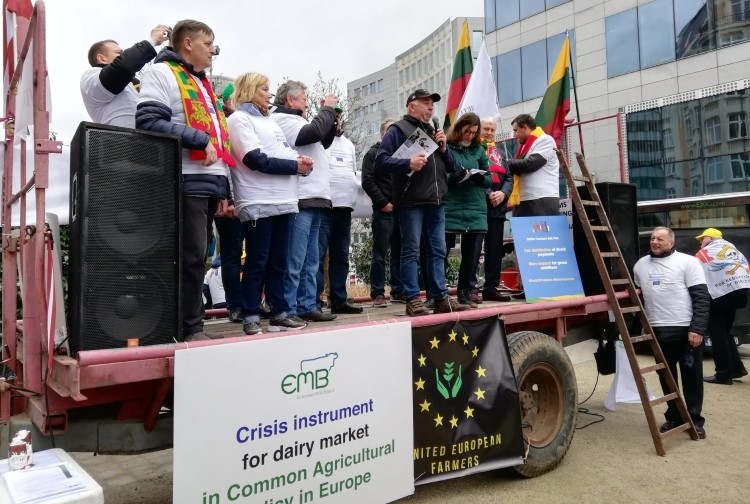Baltic farmers protest in Brussels to demand fair agricultural policy

The European Milk Board (EMB) said studies show that the EU milk price does not cover production costs.
As long as this cost shortfall continues to prevail, producers remain dependent on subsidies, the EMB argues.
However, these subsidies vary from one Member State to another, such that in 2017, farmers in Lithuania, Latvia and Estonia received only 54 to 60% of the EU average in direct payments.
Jonas Vilionis, president of the Lithuanian dairy farmers' association, LPGA, sees this unequal treatment as a major issue.
"Direct payments are lower, but all products have to comply with the same requirements. Our farmers must comply with the same environmental-protection, animal-welfare and food-safety standards as in other EU Member States, but without the equivalent compensation," Vilionis said.
Vilionis called for an equal distribution of direct payments. This would, however, only be possible with an appropriate CAP budget. Therefore, the EU agricultural budget should not be reduced in any way, the EMB argues.
The EMB, the umbrella organization of European dairy farmers, also highlighted the need to reduce the dependence of farmers on subsidies to make a living.
Erwin Schöpges, president of the EMB, said it is important for agricultural income to be earned from the market in the medium term.
"We need milk prices that cover production costs – including fair remuneration for farmers," Schöpges said.
The EMB said its Market Responsibility Programme (MRP) would keep the dairy market in equilibrium and prevent drastic price reductions.
Sieta van Keimpema, vice-president of the EMB, called on the EU Institutions like the Commission, the Council and the Parliament to support the inclusion of an effective crisis instrument in the future Common Agricultural Policy.
"Many EU policy-makers have seen the devastating consequences of recent crises with their own eyes. That is why truly important proposals are now on the table and there is a strong motivation among policy-makers for such an instrument,” van Keimpema said.
“It is essential for the proposals like voluntary volume reduction with capping during crises as well as – during severe crises – temporary compulsory reduction to actually find their way into the CAP. This would provide the legal basis for quick reactions to market disturbances."




